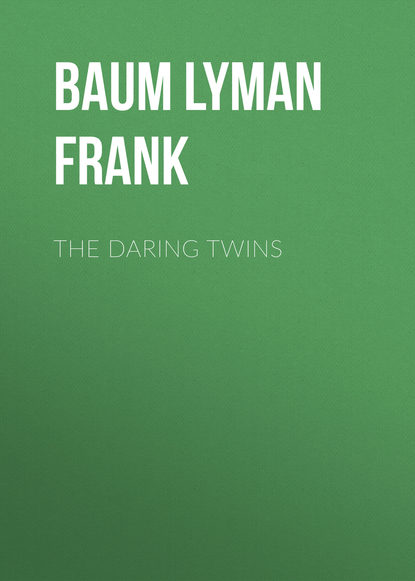По всем вопросам обращайтесь на: info@litportal.ru
(©) 2003-2024.
✖
The Daring Twins
Настройки чтения
Размер шрифта
Высота строк
Поля
Eric left early that afternoon, when Phil took occasion to carefully compare the two checks issued by Mrs. Randolph. That for two hundred was not numbered and seemed to have been very hastily written.
There was a dull ache in young Daring’s heart as he put away the books and papers and prepared to go home. An odd suspicion had forced itself upon him – a suspicion so cruel and deplorable that the boy reproached himself for harboring it for even a moment.
That evening he had a long talk with Phœbe, his only confidant. After relating to his twin the circumstances of Martin’s deposit and Mrs. Randolph’s curious check he said:
“I know I am wrong to be mistrustful, for Eric is Mr. Spaythe’s only son, and would not, of course, attempt to rob his father. But when Martin pushed his money over the counter to Mr. Boothe he said in a loud voice: ‘There’s three hundred and eighty dollars more toward my savings’; so, in spite of that deposit slip, I am almost sure he banked the entire amount.”
“Can Eric get into the safe, where the money is kept?” asked Phœbe, after some thought.
“Of course. He has to put away the books, and often we are not through with our work upon them until after Mr. Boothe has gone. They both have the combination of the safe and the keys to the bank. Naturally, I have not been entrusted with either, as yet.”
Phœbe took time to consider this.
“I suppose,” she finally said, “it would be quite possible for Eric to take a hundred dollars from the safe and then make the entry of Mr. Martin’s deposit a hundred dollars less than it actually was.”
“Yes.”
“Then no one would suspect what Eric had done.”
“Why, the books would not show the theft, of course; but in time Mr. Martin will be sure to discover that he has not been credited with that hundred dollars, and that will lead to an investigation. It’s the same way with Mrs. Randolph’s check,” added Phil, regretfully. “She has a large amount on deposit, and may not discover for a long time that her account is two hundred dollars short.”
“Are you sure she did not sign that check?” asked Phœbe.
“No; I cannot be positive. Mrs. Randolph is in the habit of drawing money from the bank but once a week. She writes neatly and numbers all her checks. To-day I found an entry that Eric had made in the book showing she had drawn two hundred, and the check itself, which should have been among those Mr. Boothe had cashed and turned over to me, was missing. Almost immediately came in the usual check for fifty, made out in Mrs. Randolph’s neat and careful way. Naturally, I was puzzled. When Eric finally found the two hundred dollar check, it was not like Mrs. Randolph’s checks at all, although the handwriting was similar.”
“Have you noticed any other suspicions things?” the girl inquired.
“Several,” replied Phil, after a brief hesitation. “But, I’ve never even dared to suspect Eric before. I hope I’m wrong; indeed, I must be wrong!”
They were walking along a country lane in the twilight. Phil’s arm was around his twin’s waist; the scent of new mown hay came to them from the neighboring fields.
“I do not think you are justified in accusing Eric to his father,” said Phœbe, musingly. “It will be better to keep your suspicions to yourself.”
“That is my idea. I’m not hired as a detective; I’m merely a bookkeeper.”
“Still,” she said, “you owe a certain loyalty to Mr. Spaythe. If an employee discovers the bank being robbed it is his duty to speak; unless – ”
“Unless the robber is the banker’s own son,” added Phil; “in which case it would be a kindness to keep the knowledge from him.”
Phœbe sighed.
“Eric has a good heart,” she observed, “and I’m sure he’d never think of taking money from anyone but his father. He isn’t robbing the customers of the bank by these acts, you know.”
“That is true, for the false entries are certain to be discovered, when the bank will be obliged to make good the deficiencies. Eric realizes this, I suppose. He has been very extravagant lately, and his father keeps him on a very small salary. So, it seems to me, he has been tempted to take what doesn’t belong to him.”
“I’m awfully sorry,” said the girl. “It’s a dreadful thing, Phil, any way you look at it. But I do not think it is your place to interfere. Fate will take care of the problem, and Eric’s final downfall is certain.”
“Would you advise me to have a private talk with him, and tell him what I know?” asked Phil.
“What’s the use? He cannot put back the money he has taken. Better let the thing run its course, Phil, and keep out of it yourself in every way.”
“I will,” said Phil, with decision.
But Eric was not long in discovering a change in Phil’s attitude toward him. The young man did not mean to alter his manner toward his old friend, but their former congenial relations were rather abruptly broken off, much to Eric’s surprise. Then the latter became suspicious, and while he spoke to his colleague as cheerfully as of old, Phil frequently caught Eric watching him with a sly, searching glance that had a trace of fear in it. This mistrust gradually wore away when the banker’s son found he had not been betrayed, or even questioned. If Phil found any entries in the books that did not look exactly right to him, he passed them over and said nothing. This served to restore Eric’s confidence in him, and the two boys continued to work together in perfect harmony.
Phœbe was very miserable over Phil’s discovery of Eric’s irregularities. It was the first time any disgraceful or criminal act had been brought close to her knowledge, and she became nervous for fear her twin might, in some way, become implicated in the terrible affair. The girl was sorry for Eric, and grieved over him with all her kindly heart. It seemed so sad that a bright young fellow with such splendid prospects should go wrong and foolishly ruin all his future life. She knew Mr. Spaythe well enough to believe he would cast off Eric without mercy when he learned the fact that his son was a thief. For this reason she sincerely hoped the banker would never make the discovery.
CHAPTER XIV
THE FOLLY OF GRAN’PA ELIOT
That night Phœbe was again aroused by the peculiar sliding noise in the next room. She had been awaiting it for so long that she was alert to the slightest sound Elaine made, and now she lost no time in silently mounting upon the table and opening the peephole she had prepared. Her own room was shrouded in gloom, but the housekeeper had placed a lighted candle upon her table, before which she was seated in her white nightrobe.
When Phœbe first observed her, old Elaine was tying the mouth of a stout canvas bag that was full of some irregular, lumpy material. Then she drew another bag toward her – there were several standing upon the broad table – and unfastened the cord that bound it while it was lying upon its side. At once a shower of gold burst forth, and with her long bony fingers the woman slid each piece of money across the table, at the same time eagerly counting it in the low, mumbling tone Phœbe had so often heard but could not before explain.
From her perch of observation the girl counted them with her. There were exactly two hundred and fifty twenty-dollar gold pieces in the bag – a sum amounting to five thousand dollars.
Elaine cautiously replaced the hoard and firmly secured the mouth of the sack. Another bag was opened. It contained smaller coins, ten-dollar pieces, and there were three hundred of them.
The woman did not hurry, although her every movement denoted fervent excitement. Bending over the table, she slowly slid piece after piece from one pile to another until all had been counted. The sacks were old and soiled. How many times, Phœbe wondered, had their contents been counted and gloated over? Five separate sacks old Elaine unfastened, counted, and tied up again, and all were filled with yellow gold. Then she twined her arms around the bulging bags and began kissing them ecstatically. “Mine!” she said in a hoarse whisper. “Mine – mine!” Then she reached down and raised a trap in the floor, disclosing a cavity between the joists into which she lowered a sack. It was a familiar “thump” to Phœbe’s ears, the puzzling mystery of which was now explained. With each sack she deposited she repeated: “Mine!” in so weird a tone that it sent the chills coursing down the back of the startled and amazed girl.
Now Elaine replaced the trap, drew the rag carpet over it and stood upright. She cast an undecided glance around and walked to the old-fashioned mantel that stood against the opposite wall. It was made of some dark wood, and had been quite cleverly carved. Nearly every bed chamber in the house had a similar mantel and fireplace.
Elaine put her hand to one corner and the entire woodwork swung outward on hinges, showing a deep cavity which was lined with narrow shelves. Except as the woman herself obstructed the view, Phœbe could clearly see the whole of this secret cupboard, which had been ingeniously built into the chimney. The shelves were covered with stacks of silver coins and thick packages of bills. The silver Elaine merely glanced at, but the packets of paper money she piled into her loose robe, gathered into a sack, and carried it to the table, where she proceeded methodically to count it. The eagerness she had displayed while counting the gold was now lacking in her manner. She was intent enough upon her task, and handled each bill with loving care; but only the hard yellow gold had seemed to enrapture her.
Phœbe’s limbs were getting numb and her knees knocked together tremblingly; but she stuck obstinately to her post of observation until Elaine had finished her self imposed task and replaced the money. This accomplished, the woman swung the mantel into place and with a leer of cunning and contentment still lingering upon her wrinkled features blew out her candle and went to bed.
Phœbe closed the slide and managed to climb down and creep into her own bed, without making a noise. Then she lay shivering with nervous chills, induced by the astonishing discovery she had made.
There was no sleep for the girl that night. At first, a supreme bewilderment prevented her from thinking clearly; but, after a time, she grew more composed and began to marshall her thoughts into some sort of order.
It was not Elaine’s money, this secret hoard; that was certain. Therefore it must belong to Gran’pa Eliot. Phœbe remembered that always while he was in health and able to be around he had personally occupied these rooms – the one Elaine now slept in, and the big front room opening out of it, where he now sat propped up in helpless oblivion of all earthly treasure.
There was no longer any doubt that Gran’pa Eliot had long been a miser and cunningly secreted his wealth. He had caused the trap to be made in the floor and the cupboard built behind the mantel. With years the passion for saving had grown upon him, and after his wife’s death and his daughter’s marriage he gave free rein to his hobby and converted all his land into ready money. To avoid suspicion he had spread the report of his financial failure and claimed he was reduced to poverty.
So much Phœbe had no difficulty in comprehending. In what way the old housekeeper had discovered her master’s secret was not clear, but Elaine’s resolve not to desert Mr. Eliot was obviously due to her knowledge of his vast hoard. When he became paralyzed and helpless she realized that the fortune, unsuspected by all others, was now safely within her own grasp. Phœbe decided, shuddering the while, that the woman was a greater slave to that secret hoard than ever her grandfather had been.
When daybreak came the girl arose and quietly dressed herself. Then she softly slipped out of the house and started for a walk through the valley, hoping the morning air would cool her throbbing brain. Here, amid a silence scarcely broken by the low mooing of the cows and the crowing of the distant cocks, she began to doubt the evidence of her own senses. It was all so wonderful and unreal that she could barely admit the truth of it; and yet – and yet – . Often before she had heard the sound of the gold being slid across the table: so often, indeed, that she well knew her eyes had not deceived her when, at last, they revealed to her the explanation of the puzzling sounds.
And now the question arose, what should she do? How should she act, now that she had discovered this terrible secret? The knowledge of her grandfather’s wealth in no way elated her; rather did she feel scorn and resentment at his despicable weakness. It hurt her to think that her mother’s father could be guilty of such folly and pitiful sordidness. It was too soon for her to reflect that this money might easily affect the fortunes of her brothers and sisters and herself; all she thought of was the shame of the thing, that her grandfather could become a miser and gloat in secret over the dross of gold and silver – and soiled bank notes. What an abominable, inhuman passion it was – a passion shared by old Elaine Halliday, a creature Phœbe had always despised intuitively.
During an hour’s brisk walk she became sorry that her curiosity had led her to discover this horrid secret. But she resolved to keep her own counsel and tell no one what she had seen. Even Phil must be spared this humiliation, for the poor boy had quite enough to worry him already.
Phœbe returned to the house with glowing cheeks and bright eyes, in spite of her sleepless night and mental perturbation. She greeted the family cheerfully and took her seat at the breakfast table with her native composure fully regained.
“When is the boat race, Phil?” asked Miss Eliot.
“A week from Saturday,” he said. “I’ve got to practice with the boys every evening, from now on. I wanted them to let me out, this year, but they foolishly insist on my pulling stroke.”

















